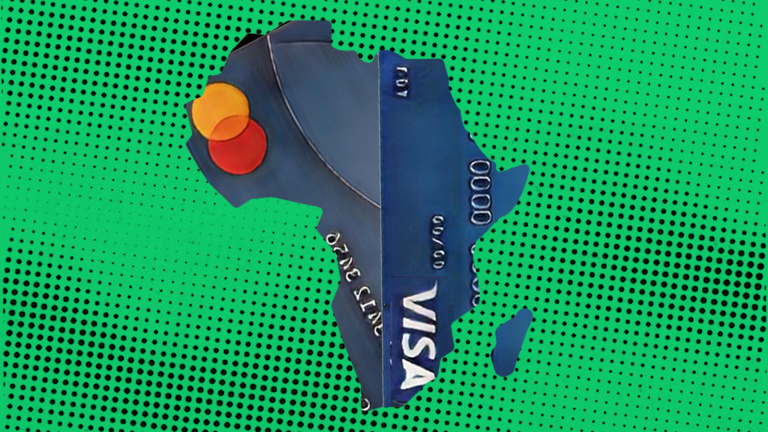
On January 29, about two weeks after it concluded its inaugural Africa Fintech Accelerator program, U.S. fintech giant Visa opened applications for the second cohort. In the first batch, teams from 23 African fintech startups had spent three months interacting with experienced mentors and investors, and learning about the latest technology in the sector.
Visa’s accelerator program was announced merely six months after Mastercard’s NGO, the Mastercard Foundation, launched a fund to invest in early-stage companies through local investment firms. Investment companies in Nigeria, Kenya, Uganda, and South Africa have already begun to receive funds from the foundation.
These are just two examples of how Visa and Mastercard — U.S.-based global payment-technology giants — are trying to expand their footprint in Africa. Over the past five years, besides engaging with startups, both companies have forged partnerships with large African telecoms that operate vast fintech businesses, and have made direct investments into local unicorns.
African fintech entrepreneurs and experts believe these moves will help Visa and Mastercard expand their existing businesses, and also stay relevant on the continent at a time when digital wallets and quick codes are gaining popularity.
Visa and Mastercard “make money when there is a transaction made with the card, so their ambition is to get more and more people in Africa to use their own cards, and for that, they need the help of fintechs,” Ismail Belkhayat, founder and CEO of Chari, which was part of the inaugural batch of Visa’s Africa accelerator program, told Rest of World. “So they are helping more startups become issuers delivering cards to the end users. And the way they do it is [mostly] through accelerators.”
Belkhayat believes the two giants are in a race to dominate the growing digital payment market in Africa by getting the best fintech companies on their side. “[They] give what we call ‘incentive plans’ to the fintechs to start using [their] infrastructure that includes the payment gateways, the cards, and APIs,” he said.
In an email to Rest of World, a Visa spokesperson said Africa is important to the company’s overall mission, which is reflected in its activities on the continent.
“We’ve been increasing our investments in Africa steadily, and just over a year ago pledged to invest $1 billion in Africa over the next five years to scale operations, deploy innovations, and deepen collaboration,” the spokesperson said.
Mastercard and Mastercard Foundation did not respond to Rest of World’s requests for comment.
Visa and Mastercard have directly and indirectly invested around $700 million into Africa’s payment industry, according to public announcements by the two companies. Their most significant partnerships have been with the bigger telecom companies on the continent.
Just last month, Mastercard agreed to buy a 3.8% stake in the mobile money business of Africa’s largest telecom, MTN, for $200 million. In 2021, the company had bought a similar stake in the mobile money operations of another leading telecom firm, Airtel Africa, for $100 million.
In 2022, Visa said it had started integrating its global virtual card network with Kenyan company Safaricom’s mobile money platform, M-pesa, which holds a 99% market share in the country.
“Visa and Mastercard were able to convince and enable banks to make big investments in payment technology, and some of those early investments sparked and continue to support huge parts of fintech innovation today,” Tochukwu Ironsi, an analyst at tech publication Decode Fintech, told Rest of World.
According to Victor Asemota, partner at venture capital firm AnD Ventures, Visa and Mastercard opened Africa to the world and improved how business is done on the continent. “Before them, there was a lot of chaos,” Asemota told Rest of World over text. “I remember when Interswitch launched their failed magstripe cards without EMV (Europay, Mastercard, and Visa) standards. It was chaotic. Visa and Mastercard brought sanity.”
Some of Visa and Mastercard’s recent moves show that the two giants are trying to catch up with digital money, which has become wildly popular across Africa, Asemota said. “Mastercard investing in MTN MoMo (mobile money) is an acknowledgment of that fact.” Visa has directly invested in more than five African fintech startups, including three of the largest players in Nigeria and one company each in Sudan and South Africa. Mastercard has directly invested in Africa’s biggest e-commerce player, Jumia, besides backing more companies through its foundation.
Mastercard Foundation has provided several grants and non-equity investments to African startups, Olanrewaju Odunowo, head of data and insight firm TechCabal Insight, told Rest of World. “What’s critical about Mastercard Foundation’s fund is that it is impact investment that’s coming at a time when funding is drying up,” he said.
Belkhayat and Femi Iromini, the founder of Nigerian fintech Moni — who was also part of Visa’s accelerator program — told Rest of World the initiative exposed them to the depth of Africa’s payment ecosystem, innovative funding opportunities, and new technologies, including Visa’s suite of products.
The concluding ceremony for the first batch was attended by “all the key stakeholders of the Moroccan fintech ecosystem, including the regulator, the national switch, the acquirers, the banks, financial institutions, and Moroccan fintech companies,” according to a LinkedIn post by Belkhayat.
“My biggest benefit from the Visa acceleration program is the training to understand better the payment ecosystem, which is very deep and complex,” Belkhayat said. “They showed us all the services they can offer. They also took us through countries in which payment is evolving, mainly Kenya. We’ve seen the future of payments thanks to them. They also made us meet other startups in other geographies.”
Iromini said one of the biggest benefits of the program is the access it provides to investment opportunities. “Bigger organizations like Visa and Mastercard with a bigger bargaining power should create such programs to collaborate with startups and support them,” he said. “The program creates an opportunity for Visa to learn new ideas from startups, and [for] startups to leverage [their] scale for distribution and experience.”